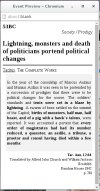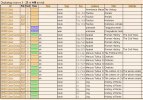I'd like to repeat that all contributors, before making too many edits, should assign to me just 1 (one) Event of their choice for reviewing before other Events are edited. This is important, because the feedback I'll be giving you (either via the feedback system, or here in the forum) should be the basis for editing all other Events.
Here is an example of the kind of feedback I'll be giving you, e.g. for Source #198 which was edited yesterday. Source #198 now reads:
Source type: web
Authors: Libanius
Title: Monody: Funeral Oration for Julian
Publisher: Online edition
Address: Ipswich, UK
Translator: Roger Pearse
Year: 2003
HTML URL: http://www.tertullian.org/fathers/libanius_monody.htm
The User Manual states that a Source "is one physical volume (one single “book” in the modern sense of the term)", even "when the text is re-published in, and copied from, the internet." Always try to locate the original. Many old books can be found on Archive.org. I quickly found the original with a Google search: https://archive.org/details/julianemperorco01juligoog. When you look at the title page of the PDF, it will help you entering the following info to the Source:
Source type: book
Authors: "Gregory of Nazianzus" and Libanius
Title: Julian the Emperor
Subtitle: Gregory Nazianzen's two Invectives and Libanius' Monody, with Julian's extant Theosophical Work
Edition: Bohn's Classical Library
Publisher: George Bell and Sons
Address: London
Translator: C. W. King
Editor: Roger Pearse
Year: 1888
Contains source keys: Liban:Or
Roger Pearse is the one who digitized the book and made it available as HTML, he's NOT the translator! So, I would put him as editor.
This webpage here http://www.attalus.org/info/sources.html has a useful list of "Source Keys" which are generally used by historians. If available, such "keys" should be entered into the "Contains source keys" field of a Source, and then selected for Texts, so that the computer generated citations come out fully and correctly. In the above example the key is "Liban:Or".
Also, if possible, download the PDF from Archive.org (Download -> PDF), and upload it to the HED. It will be useful to have our own virtual library. I've done this already for some works of Livy, Cicero, Appian and Tacitus (see PDF links in the screenshot). This page https://ryanfb.github.io/loebolus/ has PDF download links for a large part of the Loeb Classical Library, published by Harvard University Press. When selecting PDFs for upload, prefer the ones from Archive.org. These PDFs have
OCR applied and are thus searchable, and you can copy/paste text from them.

 After filing more than 4000 Events last year 2014, this marks the second major stage in the HED project. For all previous contributors, and all others who want to help out in the future:
After filing more than 4000 Events last year 2014, this marks the second major stage in the HED project. For all previous contributors, and all others who want to help out in the future:





 The alternative is the traditional approach: One single person collects stuff in a Word document and is responsible for all formatting and correctness. But this project is already much too large for a single person, the only way for it to succeed is when the load is shared amonst many, and for that, all contributors must be 'on the same page'.
The alternative is the traditional approach: One single person collects stuff in a Word document and is responsible for all formatting and correctness. But this project is already much too large for a single person, the only way for it to succeed is when the load is shared amonst many, and for that, all contributors must be 'on the same page'. 




